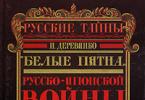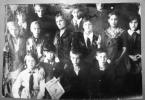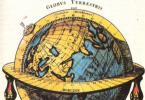Starting with this posting, I will regularly talk about history books I liked (or didn’t like). Such entries will be tagged with the tag “review”, however, a review in its pure form presupposes a certain amount of text from the reviewer about the book, but I will most likely talk more about the books with excerpts from them.
Let's start with the book by Ilya Derevyanko ""Blank Spots" of the Russo-Japanese War". M.: Yauza, Eksmo, 2005
The book covers such a little-studied topic in Russian historiography as the activities of central bodies - the War Ministry and the General Staff during the Russo-Japanese War, as well as the activities of Russian intelligence in the theater of military operations during the same period. The book contains previously unpublished documents concerning intelligence activities.
The book says almost nothing directly about the fighting itself.
The objectives of the work predetermined the structure of its construction. As mentioned above, almost the entire historiography of the Russo-Japanese War examines the actual course of hostilities, therefore the author, while covering it in general terms, does not set himself the task of presenting it in detail.
Chapter 1 examines the organizational structure of the ministry before the war and changes in its structure caused by the fighting in the Far East. At the same time, the main attention is paid to such important issues as the staff and budget of the ministry, the competence and powers of its head - the Minister of War; bureaucracy of “perestroika” of the management apparatus, etc. This chapter is a necessary prelude to the story of the work of the War Ministry apparatus in war conditions. The issues raised here - such as funding, staffing, and the slowness of the bureaucratic apparatus - then run like a red thread through the entire work. At the beginning of the chapter, the unsightly social atmosphere in which the military department of the empire had to work during the period described is briefly shown.
The second chapter - “The General Staff during the War” - covers very diverse issues - such as recruiting the active army and retraining the reserve ones; tactical training of troops; intelligence, counterintelligence and military censorship; maintenance of prisoners of war and, finally, military transportation. They are collected here together, since they were all under the jurisdiction of the General Staff. The purpose of the chapter is to show how this main part of the War Ministry worked in an extreme situation, how its work was reflected in the active army. It should be noted that the activities of the General Staff, in accordance with the goals and objectives of our study, are considered only in relation to the events of the Russo-Japanese War. Therefore, the activities of the General Staff in relation to the rear units stationed on the territory of Russia on a permanent basis remain outside the scope of this chapter.
In the third chapter, which is called “Administrative and economic activities of the War Ministry to support the active army,” the author examines the work of those structural divisions of the ministry that were in charge of the administrative and economic part. During the war, the main directions of the administrative and economic activities of the ministry were supplying the active army with weapons, ammunition and engineering equipment; providing food and uniforms, as well as organizing medical care for the army. In accordance with this, the author examines in turn the work of the Main Artillery, Chief Engineering, Main Quartermaster and Main Military Medical Directorates. Just as in the case of the General Staff, the work of these departments is studied in relation to the Russo-Japanese War and the active army, however, the author also focuses on the consequences for the general condition of the Russian Armed Forces, which resulted from the massive withdrawal of emergency reserves for the active army troops remaining in a peaceful situation.
The monograph does not contain a special chapter devoted to the activities of the Ministry's Military Council. This is explained by the fact that during the period described, the Military Council dealt almost exclusively with economic issues, therefore, in the author’s opinion, it is most advisable to consider the work of the Military Council without interruption from the administrative and economic activities of the corresponding main departments of the War Ministry, which is done in the third chapter. In addition, in both chapters 2 and 3, the author tries, in the context of the activities of specific bodies of the War Ministry, to identify the decision-making mechanism and to show the underside of the work of the administrative apparatus.
Any mention of the Russo-Japanese War is closely connected with the name of Commander-in-Chief A.N. Kuropatkin, but to date there is no objective assessment of his activities either in historiography or in fiction. The author did not set himself the task of speaking in detail about him and assessing his activities, but nevertheless, the work repeatedly touches on issues related to the relationship between the command of the active army and the War Ministry.
A separate study is required to assess the personality of General A.N. Kuropatkin, but the author hopes that the questions he raised will help the future researcher in his work.
The monograph does not have a special section on the work of the Main Military Judicial Directorate, since the volume of its work in connection with the Russo-Japanese War was extremely small, and the main burden fell on the military judicial authorities locally and in the active army. The little that can be said about the work of the GVSU does not qualify not only for a separate chapter, but even for a section, and therefore, in our opinion, this should be stated in the comments. The same applies to the Main Directorate of Cossack Troops.
The work only briefly and sporadically touches on issues related to the Main Directorate of Military Educational Institutions. The fact is that this topic is so broad and special that it requires independent research. In order not to let my thoughts wander, the author is forced to focus only on those structural units of the Ministry of War that were most closely in contact with the active army.
Due to the fact that the monograph is devoted specifically to the central apparatus of the Ministry of War, the author does not consider the management activities of the headquarters of military districts, including those adjacent to the theater of military operations. This also requires a separate study.
Due to the fact that the relationship between the War Ministry and other ministries during the Russo-Japanese War was extremely scanty, they are covered briefly, in proportion to their volume.
In the “Conclusion” the author tries to summarize his research.
The work is provided with comments and appendices. In the “Comments” the author tried to highlight those issues that do not directly relate to the main object of the study, but are of interest as additional information confirming the author’s point of view. The “Appendices” contain a diagram of the War Ministry; excerpt from the satirical magazine “Beak” (No. 2, 1905); report from the commander of the 4th East Siberian engineer battalion to the chief of staff of the 4th Siberian Army Corps; information on the state of emergency reserves in military districts after the Russo-Japanese War as a percentage of the required quantity, as well as a list of sources and literature used. The list of references includes only those works that contain at least fragmentary information about the activities of the War Ministry apparatus during the Russo-Japanese War.
This text does not mention in any way the second part of the book, containing intelligence documents. So this part there is very significant and interesting because of the documents presented, from which it is quite possible to get an idea of the activities of our intelligence service during that period.
The book is available on militar (though without the second part, where there are documents from the special services) -
What do we know about the Russo-Japanese War of 1904 - 1905? Russia was on the verge of a catastrophe that changed the course of history: there were 10 years left before the First World War and only 13 years until October 1917. What could have happened if we had won this war? And why did we lose it? Soviet historians blamed Commander-in-Chief A.N. for everything. Kuropatkina, but is this really so? Whose evil intent is behind the Moonsund tragedy? These and other questions will be answered in I. Derevianko’s book “Blank Spots” of the Russo-Japanese War.” The author knows very well what he is writing about. He was the first to begin researching the history and organization of the military intelligence services of the Russian Empire, publishing a number of works on this topic in the late 80s and early 90s of the 20th century. One of his books, “Russian intelligence and counterintelligence in the war of 1904 - 1905.” Documents", published in 1993 by the Progress publishing house, six months later was translated into Japanese and published in Yokohama.“Blank Spots” of the Russo-Japanese War - description and summary, author Ilya Valerievich Derevyanko, read for free online on the electronic library website website
Starting from this posting, in the “Reviews” section we will regularly talk about history books we liked (or didn’t like).
Let's start with Ilya Derevyanko's book "White Spots" of the Russo-Japanese War. M.: Yauza, Eksmo, 2005
The book covers such a little-studied topic in Russian historiography as the activities of central bodies - the War Ministry and the General Staff during the Russo-Japanese War, as well as the activities of Russian intelligence in the theater of military operations during the same period. The book contains information relating to intelligence activities.
The book says almost nothing directly about the fighting itself.
The objectives of the work predetermined the structure of its construction. As mentioned above, almost the entire historiography of the Russo-Japanese War examines the actual course of hostilities, therefore the author, while covering it in general terms, does not set himself the task of presenting it in detail.
Chapter 1 examines the organizational structure of the ministry before the war and changes in its structure caused by the fighting in the Far East. At the same time, the main attention is paid to such important issues as the staff and budget of the ministry, the competence and powers of its head - the Minister of War; bureaucracy of “perestroika” of the management apparatus, etc. This chapter is a necessary prelude to the story of the work of the War Ministry apparatus in war conditions. The issues raised here - such as funding, staffing, and the slowness of the bureaucratic apparatus - then run like a red thread through the entire work. At the beginning of the chapter, the unsightly social atmosphere in which the military department of the empire had to work during the period described is briefly shown.
The second chapter - “The General Staff during the War” - covers very diverse issues - such as recruiting the active army and retraining the reserve ones; tactical training of troops; intelligence, counterintelligence and military censorship; maintenance of prisoners of war and, finally, military transportation. They are collected here together, since they were all under the jurisdiction of the General Staff. The purpose of the chapter is to show how this main part of the War Ministry worked in an extreme situation, how its work was reflected in the active army. It should be noted that the activities of the General Staff, in accordance with the goals and objectives of our study, are considered only in relation to the events of the Russo-Japanese War. Therefore, the activities of the General Staff in relation to the rear units stationed on the territory of Russia on a permanent basis remain outside the scope of this chapter.
This text does not mention in any way the second part of the book, containing intelligence documents. So this part there is very significant and interesting because of the documents presented, from which it is quite possible to get an idea of the activities of our intelligence service during that period.
The book is available on militera (though without the second part, where there are documents from the special services) - http://militera.lib.ru/h/derevyanko_iv/index.html
You can also buy it on Ozon.ru
Our summary:
If you are interested in the Russo-Japanese War, or the history of the Russian army of the 19th and early 20th centuries, or the history of the Russian special services, then this book is a must read.
And those who stood for a “united and indivisible” Russia, and those who were ready to make considerable concessions, collaborating even with the devil, even with the Germans, just to blow off their heads.
There were other reasons for disagreement. At first, the Bolsheviks lacked competent officers, and the Whites immediately had an excess of generals.
However, not all the generals' heads thought in unison. The most famous pair of opponents in the Red camp is and, and among the Whites it is Baron Pyotr Nikolaevich Wrangel. But if the intrigues between Trotsky and Stalin were extinguished, then the disagreements among the Whites only grew with the failures at the front.
The surname Wrangel, known since the 13th century, has sounded loudly more than once in Russian history. She is mentioned on the wall of the Cathedral of Christ the Savior in the list of wounded heroes of the war of 1812. Another Wrangel, who fought in the Caucasus, participated in the capture of Shamil. Wrangel Island is also well known - another distant relative of Pyotr Nikolaevich was a navigator. My father is not so famous, although he was a major collector of antiques and a writer.
And the baron’s mother, Maria Dementyeva-Maikova, surprisingly, managed to live in Petrograd throughout her entire Civil Life under the noses of the security officers and go to work in one of the Soviet museums under her last name. Only at the end of 1920 the Savinkovites arranged for her to escape to Finland. By the way, the Bolsheviks also released General Wrangel, who was detained in 1917 at a dacha in Yalta, not imagining what kind of trouble he would cause them in the future. The chaos that reigned in the country destroyed some and saved others.
The Russo-Japanese War made the baron a military man. Before that, he graduated from the Mining Institute in St. Petersburg, and then, having passed the exams at the Nikolaev Cavalry School and received the rank of cornet, he immediately left the reserve to go to Irkutsk as an official of special assignments under the Governor General. He volunteered to go to the front and showed himself there excellently, as evidenced by two orders for bravery. And between the Japanese and the world, he also graduated from the Nikolaev Military Academy and the Officer Cavalry School course.
At the very beginning, Wrangel is already a colonel. And again the awards: "George" and St. George's weapon. Even a soldier's St. George Cross, IV degree, with a laurel branch. For an officer this is a special honor, a sign of personal valor. And then the career goes upward: major general, later, already lieutenant general.
It is not surprising that with such a track record, the baron’s head thought independently and the conclusions he came to did not necessarily coincide with the conclusions of the commander-in-chief.
As Wrangel believed, White should break through to Siberia to form a connection, but considered it necessary to move to Moscow. The baron called the refusal of his plan a betrayal of Admiral Kolchak. Meanwhile, the implementation of this idea left the Don and Kuban without support, and Anton Ivanovich had obligations to the Cossacks, the refusal of which he also considered treason. It was impossible to combine two such different plans; White simply did not have such forces.
Wrangel's letters contain plenty of criticism on other grounds as well. Let's say this: “The army is falling apart due to drunkenness and robbery. I can’t exact punishment from the younger ones when the senior commanders set an example, remaining unpunished.” Or this: “War has turned into a means of profit, and contentment with local means has turned into robbery and speculation.” In general, the criticism is fair, but all these are the sins of any civil war, where there are always problems with discipline, and the combatants do not have enough real strength to restore order in the rear. The rear in a civil war belongs to deserters, bandits and marauders without any idea other than the desire for profit.
But the main thing that irritated Denikin: the baron did not send his critical letters to the commander in confidence, but distributed them as “pamphlets” (the words of Anton Ivanovich) among the command staff of the army and allies.
And as a result, all these accusations became public knowledge. According to Wrangel, such an approach should have had a stronger influence on the commander, however, in reality, this only created chaos and uncertainty in the White camp, undermining the authority of the leader. Later, this split between the former Denikinites and Wrangelites will continue in emigration.
In the end, Wrangel left for Constantinople. However, he returned very soon to replace it. In other words, Anton Ivanovich was removed from his post not only by defeats at the front, but also by a PR campaign skillfully carried out by his opponent. And, of course, the allies who relied on Wrangel. The fight with the Reds was lost by this time, and in London they were no longer thinking so much about victory as about how to get out of the situation with the least damage. In a secret note, the British issued an ultimatum demanding that negotiations with the Bolsheviks immediately begin in order to negotiate at least some concessions. As Wrangel recalled: “The British refusal to further help us took away our last hopes.”
It takes courage to agree to lead an army in a war that has already been lost. The baron did not win anything for himself personally. Nevertheless, he shouldered this heavy burden.
In a response letter to the British, the baron writes: “Perhaps a quick resolution of the issue of a truce and its implementation is necessary. Negotiations could be entrusted to representatives of the English command located here. For a calm resolution of issues related to the cessation
Ilya Derevyanko
“WHITE SPOTS” OF THE RUSSIAN-JAPANESE WAR
THE RUSSIA MILITARY APPARATUS DURING THE WAR WITH JAPAN
(1904–1905)
Monograph
Introduction
The profound socio-political changes taking place in our country could not but cause a revision and reassessment of the entire concept of national history (which historians to a large extent still have to do in the future). First of all, this affected the history of the “Soviet”, but not only: the events and outstanding personalities of the pre-revolutionary era are overestimated, for example, Stolypin’s politics, the personality of Nicholas II, etc.
The historical process is something integral, but when studying it, one can distinguish various branches of history - economic, political, military, etc. Each of these industries has its own objects of study. One of the objects of studying political history is the analysis of domestic statehood and its political institutions, including the state administrative apparatus. The study of the management apparatus involves the study of such issues as the functions, competence of management bodies, their organizational structure, relationships with higher and lower authorities, analysis of the personnel composition of the department, the main areas of activity of the management apparatus.
This monograph is an attempt to fill an obvious gap in the study of the history of the Russo-Japanese War, but its peculiarity is that the object of study is not the war itself, i.e. not the course of military operations, etc., but the organization and work of the central apparatus military-land department during the indicated period.
Both pre-revolutionary and post-revolutionary domestic historiography have done a lot to study this war. It was studied from different sides, and since the Russo-Japanese War turned into a deep shock for all layers of Russian society, the events associated with it were reflected not only in scientific, but also in fiction. The choice of the topic of this monograph is explained by the fact that of all the problems associated with the Russo-Japanese War, one very significant issue was not covered anywhere. Namely: what was the role of the administrative apparatus of the War Ministry in this war? And it is possible that shallow and often incorrect assessments of the causes of Russia’s defeat (characteristic of the historiography of the Russo-Japanese War) are due precisely to the fact that only the course of hostilities was studied and the control apparatus, its role and influence on providing the army with everything necessary was not studied at all.
What explains this? Let us make one guess. Only with the beginning of the twentieth century did an era of rapid development of military technology and total wars begin, covering all aspects of the life of the state, when armies became much more dependent on the economy of their country and the central bodies of military control. In earlier times, armies, even those abandoned at great distances from their homeland, acted largely autonomously. Therefore, when studying this or that war, historians paid all their attention to the course of hostilities, the personal qualities of the commanders-in-chief, and if they considered management structures, then only in the active army or in areas immediately adjacent to the theater of military operations. Despite the fact that the Russo-Japanese War took place already in the new era, pre-revolutionary historians continued to study it in the old fashioned way, paying almost all attention to the course of hostilities. They touched upon issues related to the central apparatus of the War Ministry very rarely, casually and in passing. The Soviet historiography of the Russo-Japanese War, as we had the opportunity to see when studying it, was not new and was based mainly on the works of pre-revolutionary historians.
Neither in pre-revolutionary nor in Soviet historiography there were special studies devoted to the organization and work of the War Ministry during the Russo-Japanese War. Meanwhile, the historiography of the Russo-Japanese War itself is very extensive. We will try to briefly consider it, paying special attention to general trends in assessments of the causes of defeat, as well as works that even slightly touch on issues related to our topic.
Already in 1905, when it became clear that the war was lost, the first works appeared, the authors of which tried to understand the reasons for the defeat. First of all, these are articles by professional military personnel published in the newspaper “Russian Invalid”. If in 1904 the general tone of this newspaper was restrainedly optimistic, then in 1905 it was replete with articles exposing the vices of the Russian military system: shortcomings of military medicine, education, training of General Staff corps officers, etc.




